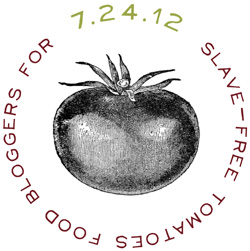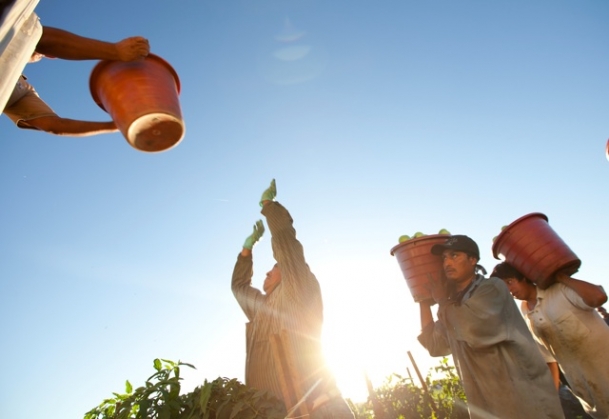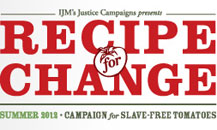Food Bloggers for Slave-Free Tomatoes
July 24, 2012

Florida's tomato fields have been called "ground zero for modern-day slavery" in this country, but we can change this. On July 24th, bloggers will donate their posts to the fight for slave-free tomatoes. It's a delicious way to celebrate summer's bounty and do good with food at the same time.
Food Bloggers for Slave-Free Tomatoes from Nicole Gulotta on Vimeo.
A philanthropic response
This event was created by The Giving Table to support International Justice Mission's summer campaign, Recipe for Change. IJM has partnered with The Coalition of Immokalee Workers and The Fair Food Standards Council (FFSC) to raise awareness about injustices in U.S. tomato fields and ask the CEOs of major supermarket chains Ahold (parent company of Stop & Shop, Giant and Martin's), Publix and Kroger, to endorse the Fair Food Program, ensuring the tomatoes you buy are slave-free.
What is the Fair Food Program?
 The Coalition of Immokalee Workers is a community-based organization of migrant workers that advocates for the rights of farmworkers in Immokalee, Florida. It developed the Fair Food Program to protect Florida's tomato pickers from exploitation.
The Coalition of Immokalee Workers is a community-based organization of migrant workers that advocates for the rights of farmworkers in Immokalee, Florida. It developed the Fair Food Program to protect Florida's tomato pickers from exploitation.
Under the Fair Food Program, Corporations that join agree to pay a small price increase for fairly harvested tomatoes (1.5 cents more per pound), and promise to shift purchases to the Florida tomato growers who abide by these higher standards – and away from those who won’t. (Whole Foods and Trader Joe's, along with several major fast food corporations, have all supported the Fair Food program, but the three supermarket chains being targeted this summer have not.)
Another expert in the field is The Fair Food Standards Council (FFSC), which oversees implementation of the Fair Food Program. The FFSC protects farmworkers by promoting a farmworker wage increase, supported by a premium paid by corporate purchasers of Florida tomatoes, and a human rights-based code of conduct, applicable throughout the Florida tomato industry.
Event Details
Who: Anyone with a food blog.
What: A day-long awareness campaign led by food bloggers. Bloggers will post a recipe using slave-free tomatoes and ask their readers to take action. By banding together, our collective voice will be amplified and we can help ensure that slave-free tomatoes are the only tomatoes.
When: Tomato Tuesday | July 24, 2012
Where: Online! We will gather across social media outlets for an all-day celebration of slave-free tomatoes.
Social Media
- Twitter: Follow @thegivingtable and tweet using #slavefreetomatoes and IJM's hashtag #R4C
- Facebook: On July 24th, post your recipes on The Giving Table's fan page.
- Pinterest: A board has been created to capture your posts!
- Download the logo to use on your own site.
Tomatoes in the News
- Your Healthy Tomatoes Were Probably Picked by Slaves | BlissTree | 8/24/12
- Recipe for Change: The Value of a Tomato | Honest Cooking | 7/30/12
- Why Won't Chipotle Sign the Fair Food Agreement? | GOOD | 7/27/12
- Recipe for Change campaign targets forced labor on US tomato fields | United Nations | 7/25/12
- Slave-Free Tomato Day Unites Food Bloggers | CityPages | 7/24/12
- Publix Pressured on Fair Food Program | West Orlando News | 7/24/12
- Chipotle, food without integrity? | Take Part | 7/12/12
- Join Michael Pollan in Ending Slavery of Tomato Workers | Take Part | 7/2/12
- Making Tomato Farming Less Brutal | Billy Cox, The Herald-Tribune | 4/20/12
- Did a Slave Grow Your Tomato? | Daniel Klein, Huffington Post | 3/27/12
- Slavery in the Tomato Fields | Barry Estabrook, The Atlantic | 6/8/11
- The True Cost of Tomatoes | Mark Bittman, New York Times | 6/14/11
Recipe for Change

Learn more about the Recipe for Change campaign on IJM's website.
Slave-free tomatoes can be found at the following locations: Farmer's Markets, CSA Boxes, Whole Foods, Trader Joe's